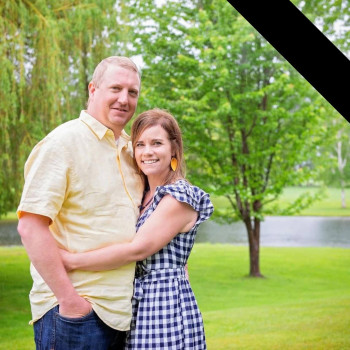Don’t Wait: What My Husband’s Sudden Death Taught Me About Men’s Health
Disclaimer: The story shared is a personal experience for informational and awareness purposes only. Always seek guidance from your healthcare provider for diagnosis or treatment.
Robert was 46. He was a devoted husband, a doting father, a wonderful son and brother, and a friend to anyone lucky enough to cross his path. He was more engaged in his health than many men his age. He’d had his colonoscopy. He used his CPAP every night. He was recovering from a recent surgery and was engaged in his health. He didn't ignore care. He didn’t avoid doctors. He tried to do the right things. But on an ordinary Tuesday, with a headache he said he couldn’t shake, he came home from work early and never woke up.
Robert was my husband. And this is not a message from a hospital CEO, but from a wife who loved her husband dearly.
Robert’s cause of death was an intracerebral hemorrhage — a type of stroke caused by bleeding in the brain. It likely started with that headache. A bleed that began quietly, invisibly. When I found him, I thought he was sleeping. By the time paramedics arrived, there was nothing left to save.
In the weeks since his death, I have read and learned as much as I could about intracerebral hemorrhage. What I have learned is there is no definitive or predictable reason why these types of strokes happen; they just do sometimes. Which, for me, is a strange dichotomy of relief and utter frustration. However, there are silent, underlying risk factors that likely increased his risk for stroke and ultimately, contributed to his death. My intent is not to place blame, but to understand, and to help others recognize what might be hiding in plain sight.
Robert mattered and he did many things right. But there were also risk factors that I now know can quietly and significantly increase the chance of a deadly stroke:
• A long history of smoking — Robert had tried to quit more than once. I had asked him many times to stop. The cardiovascular damage of smoking can linger and increase stroke risk.
• Obstructive sleep apnea — even well-managed with CPAP, Obstructive sleep apnea is linked to increased risk for both ischemic and hemorrhagic strokes. Robert was compliant, but it took many years for him to see someone about his sleep apnea.
• Obesity — which increases the strain on the entire cardiovascular system and can contribute to hypertension, even when blood pressure readings appear normal at times. Robert carried his weight well. He was 6'1, but his BMI was over 35, another risk factor.
• Chronic stress — which men often carry quietly. Stress can contribute to inflammation, blood pressure elevation, and vascular instability.
These weren’t obvious emergencies. They were slow, silent burdens. And they were treatable — but only if you know to look.
At the end of Men’s Health Awareness Month, here’s what I want someone out there to hear:
Don’t wait.
Don’t wait to:
• Schedule your annual preventative visits with your primary care provider.
• Schedule a sleep study if you’ve been putting it off — especially if your partner hears snoring, gasping, or pauses in your breathing at night. Take sleep apnea seriously.
• Get your blood pressure checked.
• Quit smoking and ask for help if it’s hard.
• Investigate recurring headaches, vision changes, extreme fatigue, or new symptoms.
• Talk to your provider about mental health and how to manage stress.
You are not invincible, nor are you helpless. You can take control. You can give the people who love you more time.
Robert was loved. And if someone reads this and makes that call, schedules that test, or takes their health seriously for the first time in years — Robert’s death and our family’s heartbreak will mean something.
Don’t wait.

